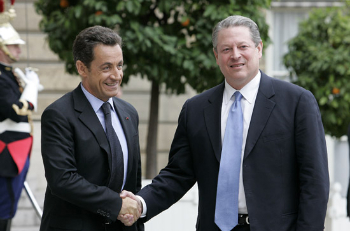Think of Nicolas Sarkozy, and what springs to mind? Carla Bruni, of course. His platform heels, probably. A somewhat aggressive manner, naturellement. Napoleon Bonaparte, pourquoi non?
 Al Gore attended the October 2007 unveiling of the Sarkozy government’s green program, called “Grenelle de l’Environnment.”Courtesy Elysee.frIndeed the French president is often compared to the diminutive emperor with the bellicose mindset, ambition to restore French glory, and glamorous and famous wife. But there’s a difference. To Bonaparte, green was just one of the shades that best suited Josephine. To Sarkozy, unexpectedly but increasingly, it is making his policies sage, in both senses of the word.
Al Gore attended the October 2007 unveiling of the Sarkozy government’s green program, called “Grenelle de l’Environnment.”Courtesy Elysee.frIndeed the French president is often compared to the diminutive emperor with the bellicose mindset, ambition to restore French glory, and glamorous and famous wife. But there’s a difference. To Bonaparte, green was just one of the shades that best suited Josephine. To Sarkozy, unexpectedly but increasingly, it is making his policies sage, in both senses of the word.
Immediately after taking office almost exactly two years ago, “Sarko” — until then best known as France’s notably conservative, not to say divisive, interior minister — announced, to almost universal surprise, that combating climate change would be one of his top priorities as president.
He was as good as his word, going straight into action at the G8 summit in Germany just a few weeks later. He joined the host, Chancellor Angela Merkel, and Britain’s then-Prime Minister Tony Blair in mounting a three-pronged attack on George W. Bush to get him to shift ground before vital negotiations in Bali the following winter.
Merkel went in for the first assault, softening him up over lunch before handing over to the French and British leaders. They discussed tactics while traveling to dinner together at a nearby castle and then jointly nobbled the American president. Blair then returned to the theme with him over breakfast the next morning.
By the end, Bush had agreed that negotiations should proceed through the United Nations, to reach agreement by the end of this year (clearing the way for December’s all-important meeting in Copenhagen). And Bush accepted a vague reference to halving global greenhouse gas emissions by 2050.
And that was just the start of Sarkozy’s greening. Little noticed in the world outside, he has instituted the western world’s most thoroughgoing green program in a country hitherto little known for taking environmental leadership.
It is known as the “Grenelle de l’Environnment” (I’m afraid I have to resist the childish temptation to call it the “Grenouille de l’Environnment”), in a reference to meetings in Paris’ Rue de Grenelle that marked the turning point in the riots of 1968. Fulfilling a campaign promise, Sarkozy brought together the government, green groups, local authorities, business and trade unions to work out a sustainable development strategy for the next 10 to 15 years.
After months of talks the participants produced an extraordinary 268 recommendations, many of which have already become law. They aim to cut greenhouse gas emissions fourfold by 2050 — and perhaps more importantly introduce tough short-term targets such as cutting carbon dioxide emissions from transport by 2020, while doubling the use of renewable energy.
More than 2,000 kilometers of new high-speed railway lines are to be built, along with 1,500 kilometers of new public transport routes in towns and cities. And the government has set out to persuade people to buy low emission cars, introducing a bonus for purchasing them, and a tax (inevitably called a “malus”) on polluting ones. “Just one year on,” Environment Minister Jean-Louis Borloo reports in the forthcoming issue of UNEP’s magazine Our Planet, “the French automotive market is changing shape. The average emissions of new vehicles sold in France have fallen by nine grams of carbon dioxide per kilometre in a single year, six times the previous rate of progress.”
At least one new solar power station is to be built in each region by 2011; by contrast, only two new nuclear power plants will be completed by 2017, despite France’s history as the world’s chief champion of the atom. By 2020 national capacities for geothermal energy will have been increased sixfold, for wind energy ten fold, and for solar photovoltaic energy 400 times over.
From next year all new government structures must have low energy consumption, followed by all new buildings in 2012. “Positive energy buildings,” producing more energy than they consume, will be introduced from 2020. And 400,000 existing homes are to be retrofitted to make them energy efficient each year.
The program is not solely concerned with the climate; it seeks, for example, to triple the share of organic farming in France by 2010 and halve the use of pesticides. But it is its effect on global warming that has cause Al Gore to call for “a global Grenelle.”
That also remains Sarkozy’s main concern.
“Doing nothing would be no less than criminal for our planet,” he says. “Doing nothing means accepting a point of no return, to be reached as soon as the average global warming tops two degrees. A decision has to be taken now, at once.”
Napoleon, famed for his impatience, could not have put it more urgently.



